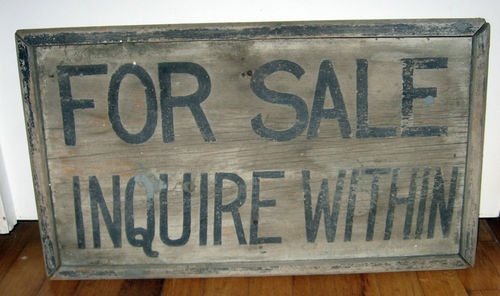Selling furniture

I never know what I am going to encounter while out buying furniture for my home or the store. Sometimes I have to leave a beautiful piece of furniture behind. This installment is about when furniture has been moved outside.
You have made the decision to part with piece of antique furniture. It’s okay. You can’t always keep everything.
It might be a beloved heirloom that you can’t keep due to downsizing. It might be that your tastes have simply just changed and it no longer fits the style of your home anymore. Maybe the china cabinet or dining room table you promised your grandmother or mother that you would cherish forever just doesn’t physically fit into the new house.
Maybe the new item has already been delivered and must occupy the same space as the old one, so you decide to move it to the garage, the carport, the storage shed, or the barn. I am here to say DON’T DO IT!
Why am I so adamant? It has nothing to do with breaking your promise to love, cherish and/or honor the wishes of a long gone relative. I understand that you might want to let someone new love, cherish and honor the item you once had promised to. It has to do with temperature and humidity.
When you live in a hot and humid climate, as we do, you like it comfortable. So does your furniture, especially antique furniture. As soon as you move it outside and out of its climate controlled space, things start to go wrong quickly. Very quickly.
When humidity and temperature start to fluctuate, wood that has been kept in a dry stable climate, starts to change, and not in a good way. The first thing that happens is the wood starts to absorb water from the air. This causes it to expand and Joints start to misalign and in antique furniture, this can be disastrous.
Dovetails expand or contract and joints loosen, furniture backs come out of grooves, wooden pins loosen and pop out of holes, shelves warp, decorative moldings separate, screws and hardware start rusting and glass can either fall out or crack when the furniture torques itself out of alignment. Once all this starts to happen, every time the piece is moved, the joints loosen a bit more, the cracks widen and the furniture starts to sit uneven. Drawers start sticking and doors don’t close evenly. These problems never fix themselves.
Furniture that is left out in garages, sheds and carports can also attract bugs. From termites, to spiders, silverfish to powder post beetles. Other insect infestations can include old house borers and carpenter ants and carpenter bees. And then you have the mammals.
Rodents chew. They chew in order to keep their teeth from growing too long and they also nest inside small spaces. When that happens, you also have their feces and urine and their bodies after they die. Whether insects, rodents, or moisture these things will do damage to old furniture outdoors whether it is made of hard or soft woods.
In addition to all this possible damage in a humid climate, you can also develop mold and mildew in or on the furniture. Both can be major health hazards and ruin furniture. Once mildew gets into wood furniture it is very difficult if not impossible to get rid of. In excessively hot climates where humidity is not a problem, the opposite happens. Wood dries out and this leads to severe cracking.
The bottom line on all of this is, storing furniture improperly can either damage the furniture beyond repair, lower the value considerably, or both. My recommendation is to leave the piece or pieces of furniture inside the home as long as possible while you list it for sale. If you must remove it, it would be best to relocate it to a climate controlled location. This also helps to avoid damage such as scratches and dings as the furniture is being moved fewer times and also helps avoid damage from things such as lawn tools, mowers and car doors. (and we didn’t even get to talk about damage to finishes)
It is never a good thing to have turn a beautiful china cabinet from a functional piece of furniture into a paint and tool storage cabinet. Protect it for the next steward to enjoy it as much as you did, and allow it to continue its march through history.

